MercoPress. South Atlantic News Agency
Tag: Mauricio Macri
-
Monday, September 9th 2019 - 09:57 UTC
Another week of uncertainties begins in Argentine markets
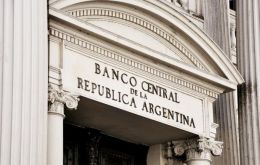
Another volatile week with still many uncertainties begins this Monday for Argentina even when some of the latest measures adopted by the administration of President Mauricio Macri helped to calm markets, debilitating apocalyptic forecasts.
-
Saturday, September 7th 2019 - 09:42 UTC
Argentine markets end the week appeased but storm clouds persist
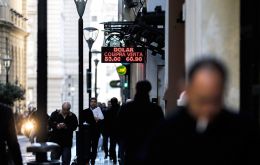
Argentine markets ended the week on a high after capital controls helped arrest a sharp plunge in the peso currency and local bond prices, but investors said the outlook remained shaky amid swirling political and financial uncertainty.
-
Thursday, September 5th 2019 - 09:57 UTC
Argentine markets rebound, despite thousands of protestors in the streets
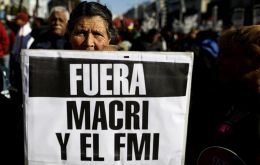
Argentine markets held steady on Wednesday, even as thousands of protesters took to the streets to demonstrate against the government of President Mauricio Macri and a darkening economic outlook in the recession-hit South American country.
-
Thursday, September 5th 2019 - 09:55 UTC
Cristina Fernandez under fire from Zion organization for comments on “oranges from Israel”

Former president of Argentina Cristina Fernandez de Kirchner has come under fire from Argentina’s Jewish community after referring to fruit imports from Israel.
-
Thursday, September 5th 2019 - 09:44 UTC
Argentine farmers changing from corn to soybeans to cut costs

Argentine farmers, anxious about an increasingly murky political outlook and economic turmoil, are turning toward soy over more expensive corn to cut costs, a shift that could impact next season’s harvest in one of the world’s top grain exporters.
-
Wednesday, September 4th 2019 - 09:58 UTC
Signs of budding of financial stability in Argentina: Peso stronger and country risk falls
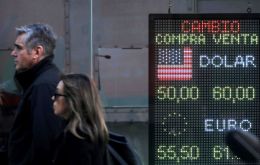
Argentina's peso surged on Tuesday, pumped up by Wall Street traders cheering President Mauricio Macri's capital controls that are aimed at protecting the beleaguered currency. The peso closed 5.39% higher at 55.98 per U.S. dollar, traders said, its strongest level in a week after a near-record low close on Friday.
-
Tuesday, September 3rd 2019 - 09:58 UTC
Falklands/Sao Paulo weekly air link with stopover at Cordoba, officially authorized by Argentina: Decree 602/2019
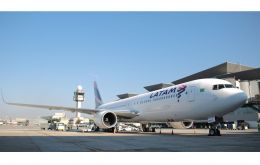
The Argentine government made official the authorization for a second weekly flight between the South American continent and the Falklands Islands, this time to Sao Paulo, Brazil with a stopover once a month, on both ways in the city of Cordoba. This means all is ready for the inauguration.
-
Tuesday, September 3rd 2019 - 09:54 UTC
Argentine bonds fall to record lows; long queues to withdraw dollar funds
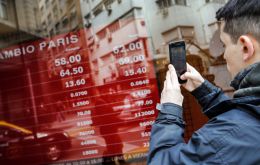
Argentine bond prices fell to record lows on Monday and the official and black-market pesos diverged after the country imposed capital controls in a bid to stem a currency rout that is sharpening the risk of default.
-
Monday, September 2nd 2019 - 09:56 UTC
Argentina imposes foreign-exchange controls to contain the run for dollars
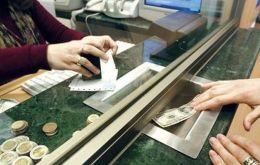
Argentina on Sunday imposed foreign-exchange controls on exporters as it closed out a week of financial uncertainty that saw a sharp drop in the peso. Exporters were ordered to seek permission from the Central Bank of Argentina before purchasing foreign currency, according to a decree published in the Official Bulletin.
-
Monday, September 2nd 2019 - 09:50 UTC
IMF supports Argentina and its temporary currency controls
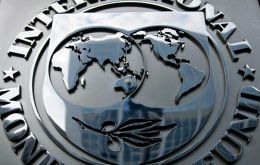
The International Monetary Fund said it will stand by Argentina after the government authorized currency controls on Sunday in an about-face by President Mauricio Macri, who had previously lifted many protectionist practices of his predecessor, Cristina Fernandez de Kirchner.
